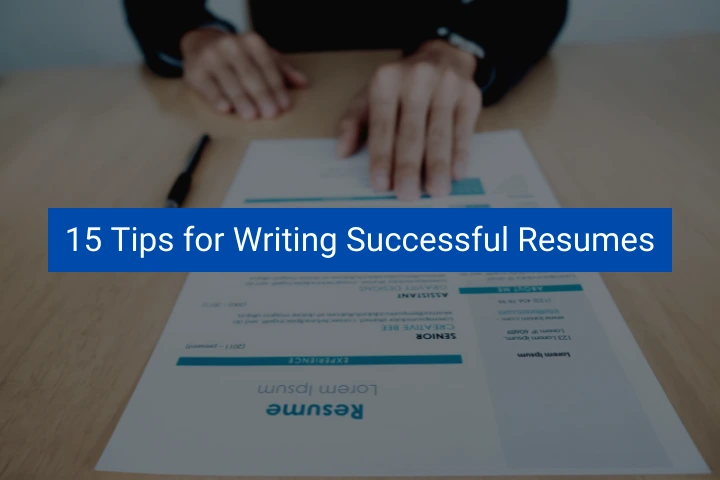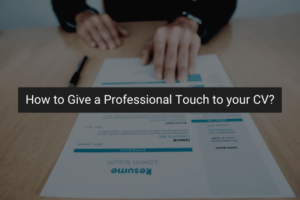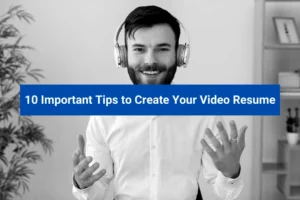Almost everyone is intimidated by the prospect of writing resumes. It's difficult to know where to begin or what to include in your presentation. It may appear to be an impossible endeavor. Here are 15 pointers to help you not only complete the assignment but also construct a successful resume.

1. Before you start creating your CV, figure out what you want to get out of it. You can build the content of your resume around your purpose once you've identified it. Consider your objective to be the bull's-eye you're aiming for with your CV. If you don't have a specific goal in mind while writing your CV, it will come across as unfocused to those who read it. Make sure you have a clear purpose in mind before you begin writing your CV.
2. Consider your resume as a sales tool. Consider yourself a product, potential employers as customers, and your resume as a self-promotional brochure. Your CV serves as a marketing tool for you. What distinguishes you and what are your advantages? What distinguishes you from others? In your CV, make sure to include this information.
3. Your resume should be used to get an interview, not a job. You don't have to go into great detail about each achievement. Make an effort to be clear and succinct. The goal of your resume is to pique an employer's interest in you enough for them to call you for an interview. Use the interview to explain your accomplishments in further detail and to secure a job offer.
4. Use bulleted sentences as much as possible. Instead of long paragraphs, use bullets with brief statements in the body of your resume. Resumes are swiftly read. This bulleted sentence approach allows someone to review your resume quickly while still understanding it.
5. Make use of action verbs. Your resume will stand out if you employ action words. Use bulleted sentences that begin with action words like prepared, produced, monitored, and presented to give your resume more vitality.
6. Make use of numbers, dollars, and percentages. In the body of a resume, numbers, dollars, and percentages jump out. Make use of them. Consider the following two examples:
- I was in charge of a department of ten people with a budget of $1,000,000.
- In a 15-state territory, sales increased by 25%.
7. Use your strengths to lead. Take the time to assess which bullets most strongly support your job search objective, as resumes are normally read in 30 seconds. Put your strongest points towards the top of the page, where they are most likely to be read.
8. Play a game of the match. Examine job postings for openings that interest you. Match the keywords in these advertisements to bullets in your CV. Add any essential words you may have overlooked to your CV.
9. Make use of keywords. Use phrases in your resume that demonstrate your expertise in a certain sector. The term "competitive analysis" for marketing professionals. Use "reconciled accounts" for accounting kinds.
10. Emphasize the positive. Negatives and irrelevant points should be avoided. If you believe your graduation date would cause age discrimination, keep it off your CV. Leave any responsibilities on your current job that don't assist your job search goal off your CV. Concentrate on the responsibilities that help you achieve your goal. Irrelevant personal information, such as your height and weight, should be left out.
11. Demonstrate your knowledge. Rather than focusing on a single field, emphasize your variety of knowledge on your CV. To provide further information, do an interview.
12. Demonstrate whom you know. If you have ever reported to a senior executive, such as a vice president or department manager, include that information in your resume. Because you reported to someone influential, the reader will assume you are influential.
13. Make your resume simple to read. Make sure there is enough white space. Use a font size of at least ten points. Your resume should not be more than 1-2 pages long. Keep in mind that resumes are evaluated fast. Assist the reader in scanning your resume quickly and efficiently.
14. Have a second person look through your CV. It may be difficult for you to hit all of your high points and accurately explain all of your triumphs because you are so close to your circumstance. Have someone look over your job search objective, résumé, and job ads that you're interested in. Encourage them to raise their hands and offer questions. Their questions may lead you to items on your CV that you had forgotten about. Make the necessary changes to your resume to include these items. Their queries can also refer to parts of your resume that the reader could find perplexing. Based on this information, revise your résumé.
15. Send a copy of your CV to prospective employers. Do not be afraid to send your resume. Consider it a game in which your chances of winning improve with each résumé you submit. With each CV you send, you improve your chances. Make use of a three-tiered strategy. Apply for several jobs that don't appear to be a good fit for you. When you interview for them, they can turn out to be more than they appeared to be. Alternatively, once you've gotten your foot in the door, you might be able to find out about further options. Apply for jobs that appear to be right in your wheelhouse. Some of those positions will require you to attend an interview. Check out how each position compares. Attempt several jobs that appear to be a reach. Taking risks is how you develop as a person. Don't rule yourself out completely. Have faith in the process. Wishing you the best of success in your job search!
For more information about interview preparations and tips to crack interviews, you can read our previous articles based on interviews.
For Human Resource, Payroll and many more HR Services, visit our website https://lingueeglobal.com/



thank you for your tips. it’s really helpful to design my resume
You’re welcome. You can also read our other articles on interviews.